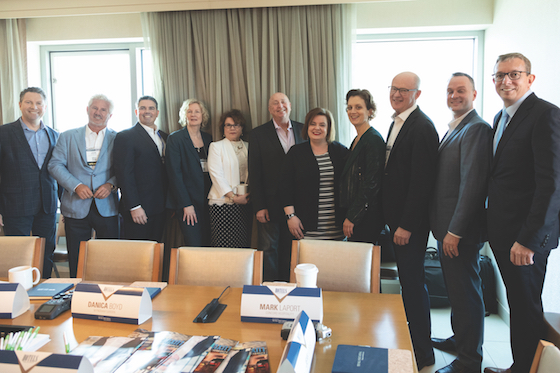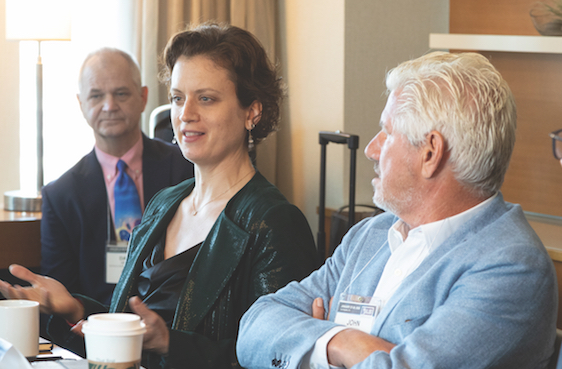In January, before the coronavirus had reshaped 2020 and the global hotel industry, HOTELS conducted a roundtable panel with leading brand executives to talk about how and where they find inspiration to address professional challenges and opportunities.
A lot has changed since that session, sponsored by the Wall Street Journal and held just before the start of BHN’s Americas Lodging Investment Summit in Los Angeles. We went back to the panelists later in the year to find out how they are leading and managing in the pandemic (read part one here, and part two here). In today’s story, our panelists get a little more personal – about how they are handling the pandemic situation, what they’re watching and who they are talking to.

H: What gives you peace of mind as you work through the COVID-19 crisis?
John Cohlan, co-founder, Margaritaville: Knowing all our Margaritaville team members – and my family – remain healthy with an optimistic view of the future gives me peace of mind.
Danica Boyd, formerly head of Wyndham Garden brand: My faith, my family, friends and fitness. These “F”s have really supported my mental health these last few months, and I am grateful my life is full of all of these.
H: Have you created some new professional goals?
Chris Silcock, EVP and chief commercial officer, Hilton: I’ve found good communication is increasingly important as the team collaborates from a distance. A regular communication cadence has been crucial for our teams. We have all learned to use video more effectively as a tool to stay connected, but I don’t believe it can ever compare to face-to-face interaction, which I am looking forward to getting back to.
H: What trends are you watching, and why?
Heather McCrory, CEO, North and Central America, Accor: Definitely demographics. The next generation coming up, who are going to be our colleagues soon, have very different opinions. They’ve never lived without an iPhone. That’s their life. The idea that they would have to go and look at a schedule or anything along those lines is just foreign to them. What we’re doing, how we’re actually making our workplace compatible to that next generation of workers or colleagues, is really important. I think it’s something that we’re paying a lot of attention to.
And there is this whole brand bomb that we’re dropping on everybody. How will they survive a downturn? This is something that I think, for me anyways, is really important. I don’t know that we’re doing enough yet about it. Making sure every brand has a reason – it’s an area that we all have, or are going to have to be careful of, in the next five years.

Silcock: It’s nothing new, but we’re at a pivotal moment with the maturation of technology processes, which has given us the opportunity to reimagine this experience, combined with the physical and digital, in a way that will be transformational to the hospitality experience… I’m watching very closely what’s happening with interfaces and voice that would make us have to reimagine much of how we engage customers… Those who do not focus on a differentiated experience, service, etc. over the next few years will find they’re in a very, very tough spot, where the only thing that matters is the price.
Julienne Smith, senior vice president, development, IHG Americas:
We need to continue to evolve and get better at our connectivity on our apps. I use all the brand apps. I go to make a reservation, and that’s pretty much it. There’s no real emotional connection to any of them. With the new generation and how they live on their iPhones and everything’s an app, that will continue to change. For me, I watch what my kids watch other kids do things on YouTube… They want experiences. That’s what they’re prioritizing. That experience in their work environment is just as important… I was interviewing somebody fresh out of college and they asked what my corporate culture was like. They never asked that question when I was right out of college. But that’s a question on the interview list.
Jeff Voris, senior vice president, global design strategies, Marriott International: The thing that I get concerned about is I wouldn’t say that we are ignoring technology. We talk about it all the time. But I don’t think the industry has done a good job of solving technology. I think that is the biggest impediment to success across the industry. Technology, when executed well, allows us to foster that deep relationship with our guests. I think of this as not about the future, it’s about going back to being great hoteliers. When you had a great hotel 50 years ago, you expected that they would know you as a guest. They’d know everything about you. They’d know when you were there last, what your family’s names were, what you like to drink and eat. You didn’t just allow it, you expected it. Then we grew so much that you just couldn’t possibly have that relationship in a 1,000-room hotel. Technology can allow us to get back to that, if it’s executed well. I just don’t think the industry is at all there.
H: You do you talk to, especially outside the hotel business?
Mark Laport, president and CEO, Concord Hospitality: Friendships of many, many years are people that also become your ad hoc consultants. You talk to them all the time. You learn from them. You also have investors that have nothing to do with our hotel business other than bringing checks, and you give them a return. But they’ve also become great friends. They may be scientists or doctors, but it’s amazing, the fresh air we get through our friendships. That information flow is so human and it has the emotion and the grit that you can’t pick up reading words or watching TV. I find that guides me.
Smith: I have found that what takes me down a different path is yoga – not just the physical practice, but meditation, practicing detachment of things, all that yoga encompasses. Over the years I’ve gone to different yoga retreats, which I highly recommend. There’s never cellphone reception and I’ve met people along the way. I continue to connect with them because most of the people I’ve met in yoga studios have a very diverse background… The feedback that they give me never has any kind of pre-conceived notions that maybe people in the hospitality industry might have. That helps me make sure that I’m continuing to follow my true north, and have a balanced perspective. I’m not letting my ego get spun out on some particular thing.
H: What inspires you and helps you in your decision making and ideation?
Smith: What comes to mind for me is a feeling, which is a collective group of people who are moving toward a true north. That’s important to me as I look at my own team, and who I’m working with. Whether it’s people who report to me, or people I work with cross functionally, to make sure there’s alignment and excitement around achieving a goal. Part of that is articulating the why. That’s what gets me going, that excitement. That’s what gets me up in the morning – delivering that and participating with a team in that way.
Silcock: It is the team members mainly that inspire me. You look at the hardships some of them have had to go through to support their families, how much they care about the communities within which they work and what they do to support those communities. We turn up stories day after day that are just a source of endless inspiration.
McCrory: Keeping people is so hard these days when you’re doing mergers and acquisitions. To me, that’s the most important part because you keep that DNA from those various brands. It’s really very motivating.

